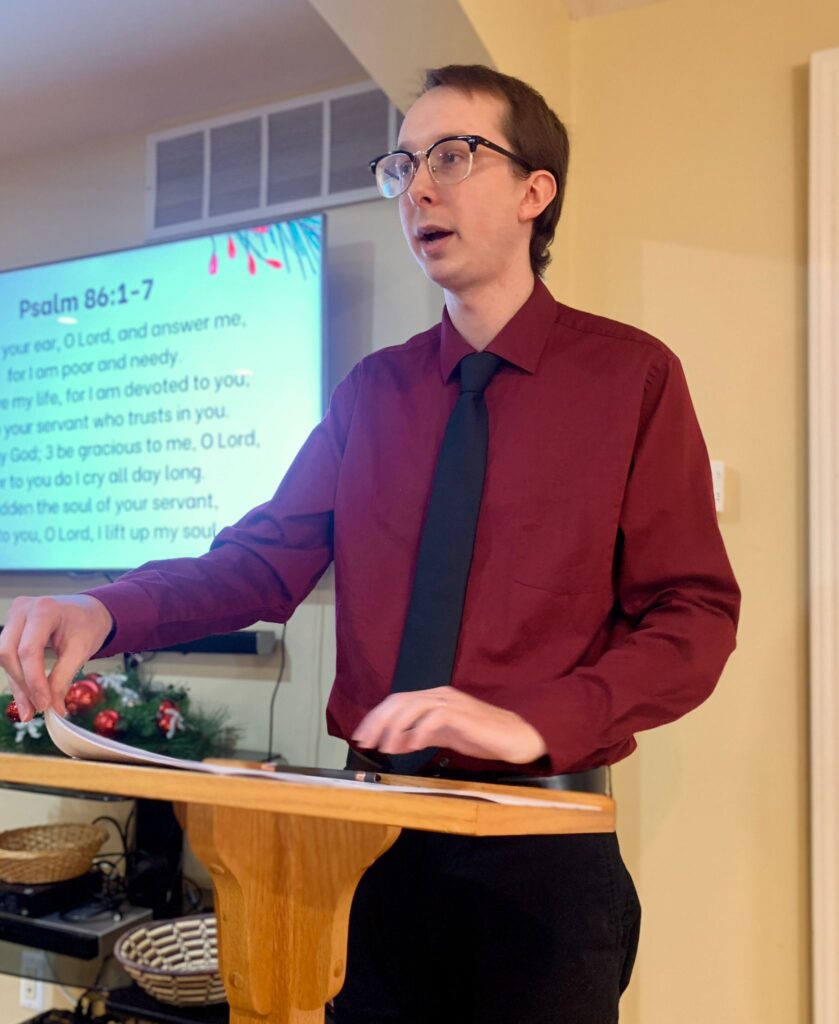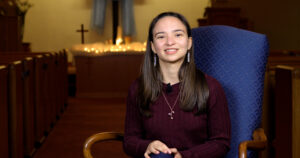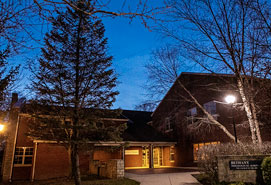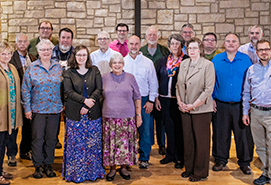Where Do Pastors Come From?

Are you preparing pastors?
It’s a question that Bethany representatives are asked almost wherever they go. Many congregations in the Church of the Brethren struggle to find pastoral leadership, and it is obvious that the patterns of developing clergy have changed over the last several decades. And the Seminary has changed as well.
In the last 10 years, enrollment has doubled at Bethany, but the growth is due mostly to the introduction of new master’s degree programs – the Master of Arts in Theopoetics and Writing and the Master of Arts in Spiritual and Social Transformation – which attract an increasingly ecumenical group of students. Despite these new ventures, the Master of Divinity remains a core offering with strong enrollment. But the paths students take to theological education and pastoral ministry seem more varied and complex than was true in the past.
Dr. Dan Poole, assistant professor of ministry formation, notes that many current MDiv students and recent alumni began serving as pastors prior to entering seminary. Often they are called to ministry within a church they attend, and then figure out how to attain theological education.
“It is relatively rare to see students enter Bethany directly after college. Many individuals come to ministry as a second career, often as a way of giving back to a congregation that has nurtured them,” notes Poole. While this approach often produces excellent results for both the pastor and congregation, it is a very different approach than the one that was common in 1950s-90s, which saw individuals earning the MDiv in their mid-to-late 20s and serving as pastors for 40 years or more.
“Congregations are needing to consider different models when it comes to hiring pastors,” says Poole.
Recent graduates provide examples of how both congregations and would-be pastors benefit from an open-minded approach to pastoral leadership that goes beyond the models that worked in the past, but are not as effective today.
*
Phil Collins, MDiv 2023, is pastor of Living Peace Church, in Plymouth, Michigan. He took on this pastoral role a full year before he earned his degree. The church had been without a pastor for several years, and while volunteer leaders had managed to maintain weekly services, even during the Covid-19 pandemic, they were tired and needed new leadership.
Collins was seeking a small church with an interest in social justice concerns, and he has found Living Peace an excellent fit. Both he and the congregation had to trust that they could make the arrangement work, even before Collins had completed his degree.
“I came to this job without much experience running a church week-to-week. They gave me the opportunity to figure that out, and I was able to give them a break from the burden of organizing everything. Now that we have spent some time together, it is great to see them pursue some new outreach efforts that they have been wanting to do for some time.”
Collins helped the congregation start a community garden, helped along from a fortuitous connection with a neighbor who had started a lot of plants in containers, and was looking for somewhere to plant them. The church, which is located in a suburb of Detroit, has also gotten involved in helping refugees. These initiatives grew out of existing interests in the congregation, but Collins was delighted to provide leadership and help the congregation meet some ministry goals.
Other aspects of his ministry at Living Peace have provided new challenges that Collins has been excited to embrace. He says that while he was an undergraduate at Judson University (Elgin, Illinois), he assumed he would become a youth minister, but about half of his current congregation is older adults.
“There is a whole different set of pastoral care issues,” says Collins. “I have appreciated the opportunity to develop new skills.”
Collins answered the call from Living Peace before he had even finished Seminary. He began serving the congregation in June 2022, while finishing his Bethany coursework. Over the last decade, it has become quite common for Bethany MDiv students to already be serving as pastors when they receive their degrees.
While this is quite different from the pattern of a few decades ago, some aspects of what is happening now track with the history of the Church of the Brethren.
“Our denomination has always called from within, but what we are seeing now is different than in the 1950s and 60s when professional training for pastors became the norm,” notes Poole.
Individuals who become pastors later in life, often as a way of giving back to a specific congregation, often stay in pastorates longer than has been typical in the past. Those who enter ministry as a second career often have families and ties to the communities where they live. Even those who serve more than one congregation in their careers land at churches close to where they are already living. For a congregation hoping to recruit a pastor to move to their community, this pattern presents challenges.
“Congregations are discovering that they need to approach things a little differently than they would have in the past,” says Poole, noting that Bethany’s approach to pastoral training has evolved to meet present needs.
The Seminary provides strong training in theology and the Bible, informed by an Anabaptist and Radical Pietist witness, but when it comes to ministry formation, Bethany is very attentive to current trends in the church, and the skills graduates will need to be successful.
“We talk about what good leadership looks like, and that includes fostering self awareness and solid spiritual practice in students. Pastors need to be able to take on organizational leadership, but they also need to be able to come alongside members of their congregations who are providing leadership and be prepared to support those efforts. This requires a lot of emotional intelligence and interpersonal skills.”
Poole acknowledges that declining membership means that pastors face a different landscape than in previous times. And he is happy to seek Bethany alumni responding positively to change.
“There was a time when there was a lot of interest in church planting or building new ministries from scratch. Recently we have seen a renewed interest in established churches and the revitalization of congregations. I think there is an acknowledgment that we better restore the churches that are already here.
Collins notes that serving as a pastor also requires one to set reasonable goals with the congregation, and to set some limits on what any single individual can accomplish.
Like many current pastors, Collins’ contract is less than full-time. His schedule allows him to cook meals for, and spend additional time with his wife, Kayla Collins, who earned a Master of Arts with a concentration in theological studies from Bethany in 2022, and is now an administrator at Henry Ford Community College. But working two-thirds time means that he needs to be thoughtful about sharing responsibilities with others.
“When I arrived here, this church had been without a pastor for several years, and they needed a break. I was able to make sure that some people who had been providing a lot of volunteer leadership had time to rest,” he says. “Now we need to work together to figure out what the future looks like.”
The congregation includes members with long family ties to the Church, but members live in several different towns across the region. The church doesn’t currently draw members from the town where it is located, which creates a great opportunity for outreach.
“We think there are a lot of people in our neighborhood who would love this church,” Collins says.
*
 Many congregations find that the most productive place to search for future pastors is in their own pews. Audri Svay, MATW 2022, was a recent graduate of Manchester University when she began attending Eel River Community Church of the Brethren to support her husband, Jake Svay, who was choir director there.
Many congregations find that the most productive place to search for future pastors is in their own pews. Audri Svay, MATW 2022, was a recent graduate of Manchester University when she began attending Eel River Community Church of the Brethren to support her husband, Jake Svay, who was choir director there.
Svay grew up in the denomination, and had received “a few nudges” toward pastoral ministry, but had earned an undergraduate degree in secondary education and planned to seek a teaching job after her husband completed his education.
“I hadn’t imagined serving as a pastor, but I knew I enjoyed preaching, so I volunteered to pulpit fill.”
After guest preaching at the church, she was invited to apply for a part-time pastor position, and was hired in April 2019. She initially served alongside two semi-retired ministers who were also in part-time roles. The congregation supported her matriculation to Bethany, where she focused on theopoetics and writing courses, but also took courses in pastoral care and worship that have proven hugely beneficial.
“Bethany deepened my appreciation of the theology behind each part of a worship service, and encouraged me to connect all my different passions — including the Bible, literature, and personal narratives,” she says. “When I first became a pastor, I was anxious about the pastoral care part of the job, but my faculty and classmates at Bethany helped me to realize that oftentimes, being present and listening is what people need most.”
In addition to her work as a pastor, Svay teaches writing courses at the University of St. Francis in Fort Wayne, Indiana, offering a course for first-year students that focuses on purpose and identity.
“I think my Master of Arts in Theopoetics and Writing influences the texts that I assign students, the writing assignments I give them, and the way I structure discussions” says Svay. “I consider my teaching a form of ministry, too.”
Like many other Bethany graduates, Svay appreciates the opportunity to minister and serve in a variety of ways. She hopes to continue teaching, and as an ordained minister in the Church of the Brethren, she intends to continue to use her gifts as a preacher, and connect with faith communities in whatever professional roles she steps into.
Bethany remains committed to training pastors, even as it acknowledges that many students are interested in serving outside traditional church settings. The Seminary’s innovative and creative approach is responsive to the changing needs of the students and serves, and it continues to demonstrate that excellent theological education provides good preparation for those hope to minister, serve, and lead in a variety of contexts.
“Our alumni have so much to offer the organizations and communities they serve,” says President Jeff Carter. “There are so many difficult issues in the world, but over and over, our alumni show the capacity to bring people together and to help make a positive difference for congregations, for other organizations, for neighborhoods, and for the world.”
written by Jonathan Graham
This article originally appeared in the Fall/Winter 2024 issue of Wonder & Word.







 Many congregations find that the most productive place to search for future pastors is in their own pews. Audri Svay, MATW 2022, was a recent graduate of Manchester University when she began attending Eel River Community Church of the Brethren to support her husband, Jake Svay, who was choir director there.
Many congregations find that the most productive place to search for future pastors is in their own pews. Audri Svay, MATW 2022, was a recent graduate of Manchester University when she began attending Eel River Community Church of the Brethren to support her husband, Jake Svay, who was choir director there. 
 Green Circle: Bethany invests in 100% renewable energy.
Green Circle: Bethany invests in 100% renewable energy.